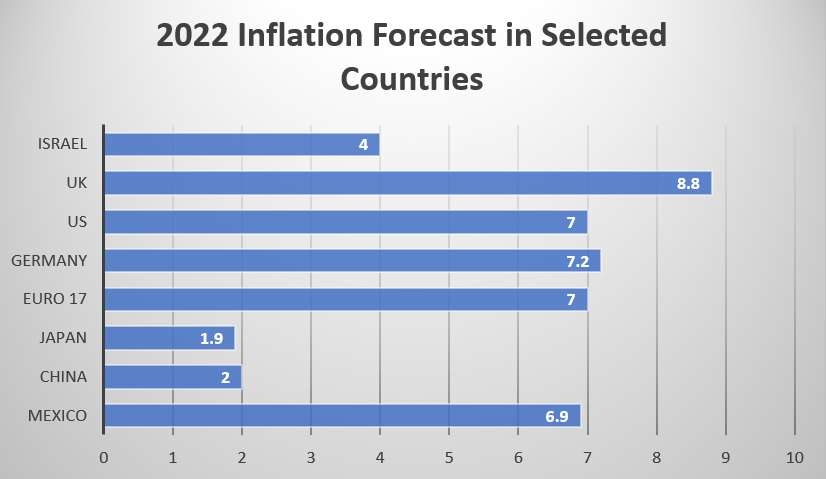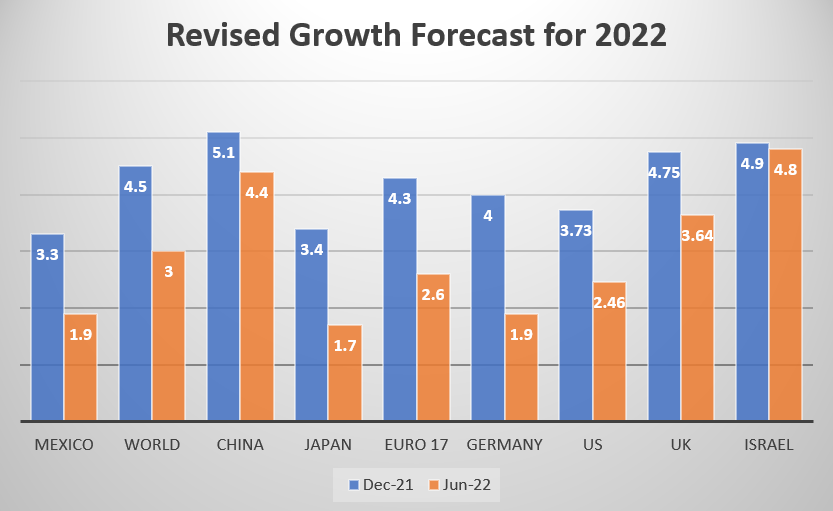Publications
INSS Insight No. 1638, August 31, 2022
Economic uncertainty has increased in recent months following the macroeconomic figures published by the major economies. The return of inflation, the supply chain crisis, and the war in Ukraine are leaving their mark on the global economy and arouse concern among both politicians and central banks. In contrast to most of the world’s countries, Israel seems like an island of economic stability: inflation is relatively low, and while Western countries are posting negative growth, second-quarter growth in Israel exceeded the expectations. Yet despite the positive data, the slowdown among Israel’s main trading partners is expected to affect the local economy, which will have to contend with a challenging economic environment in the coming months.
In recent months, forecasts of a global economic slowdown have begun to materialize, as evidenced in the macroeconomic figures published around the world, especially the United States and China. The United States economy recently posted negative growth for the second consecutive quarter; GDP was down 1.6 percent in the first quarter of 2022 and 0.9 percent in the second. China's growth in the second quarter of 2022 was only 0.4 percent, compared with a 1 percent forecast, and figures for July indicate a slowdown in the third quarter in the world's second largest economy. Industrial product figures were up 3.8 percent in July, compared with a 4.6 percent forecast, and retail sales rose only 2.7 percent, compared with an expected 5 percent increase. In response, the Chinese central bank took the surprising step – in contrast to the global trend – of cutting its interest rate to 3.65 percent.
The international economic institutions reacted to these figures by slashing their global growth forecasts again. The World Bank cut its global growth forecast from 4.1 to 2.9 percent; the International Monetary Fund lowered its global growth forecast from 4.9 to 3.2 percent; and the Organization for Economic Cooperation and Development (OECD) sliced its growth forecast from 4.5 to 3 percent. The consensus of these three institutions is that the forecasted figures are likely to drop further in the coming months, and that there are grounds for concern about a possible prolonged recession.
There are three main reasons for these bleak figures, each of which feeds on the others and creates additional factors affecting the global economy:
- Inflation: The return of inflation to center stage after a 40-year absence is a predictable result of the expansive fiscal and monetary policy pursued following the COVID-19 crisis. However, while central bankers initially claimed that inflation was merely a temporary phenomenon, in 2022 inflation did not disappear, was higher than expected, and affected most of the world's countries (Figure 1).
Source: OECD
The main concern of politicians and policymakers is that the measures needed to keep inflation in check also have a negative impact on economic activity. The United States Federal Reserve Board hiked its interest rate from near zero at the beginning of the year to 2.5 percent as of August. There have been five interest rate hikes in the UK this year, bringing the current rate to 1.75 percent. Some experts argue that the measures taken are not aggressive enough and are liable to culminate in stagflation – inflation combined with low (or even negative) growth and high unemployment. They believe that more dramatic interest rate hikes to restrain inflation are in order.
- The Russia-Ukraine war: The war has powerful negative effects on the global economy, inter alia because of concern that the fighting may spread to other regions. The sanctions against the world's eleventh largest economy, which are currently harming the Russian economy and will continue to do so, also affect the rest of the world. The decrease in Russian oil and natural gas exports have caused a sharp rise in global energy prices, with the European Union countries, which have become dependent on Russian gas, the main victims. The price of agricultural products has also risen dramatically because of Russia and Ukraine's substantial proportion of agricultural exports (about a third of the world's wheat exports). The lack of any prospect of a solution to the conflict and the war's likely continuation during the coming winter arouse anxiety that the worst is yet to come.
- The supply chain: The supply chain crisis caused by the imbalance between supply and demand resulting from the COVID-19 crisis has persisted well into 2022, together with the pandemic itself. The Chinese government's zero-COVID policy led to a very long series of lockdowns throughout the country, including in Shanghai, the economic and financial heart of China, and impeded the supply chains, which in any case had not returned to equilibrium. The climate crisis, which makes it difficult to transport goods, and the war in Ukraine also have a negative impact on the supply chains. This problem reduces the supply of products and production elements in the short term, thereby also contributing to price increases and lower productivity and economic growth.
These factors have pushed the uncertainty to center stage in the current economic climate, and undermine the economic welfare of people in most of the world's countries (Figure 2). Particularly prominent is the declining growth forecast in the major economies.
Source: OECD
Significance for the Israeli Economy
Compared to the rest of the world, Israel has demonstrated admirable economic stability. The 2022 inflation forecast for Israel is only 4 percent. It also appears that in contrast to other countries, Israel's economic growth has remained steady at nearly 5 percent. These achievements have won praise from international economic organizations, which are citing the contribution of hi-tech to exports and foreign investments in Israel.
The kudos likewise pertain to the relatively optimistic figures published by the Bank of Israel and the Ministry of Finance. The Bank of Israel expects 5 percent growth at the end of the year, and the Chief Economist of the Ministry of Finance forecasts 4.9 percent economic growth, higher than the global forecast and the forecast for the developed countries. The figures for the second quarter of 2022 showed a high growth of 6.8 percent. Additional data highlight the Israeli economy's resilience in the first half of the year in the face of global uncertainty. The unemployment rate in June was only 3.4 percent, the same level as before the pandemic. According to the Israel Central Bureau of Statistics, exports of goods from Israel rose steeply in comparison with the corresponding period in 2021. As a result of the release of demand repressed by the COVID-19 crisis, prosperity in the hi-tech sector, and growth in the real estate market, tax revenues in the first half of the year were NIS 50 billion higher than in the corresponding period last year. The Ministry of Finance Chief Economist predicts that tax revenues will total NIS 456 billion, reflecting an expected budget surplus of NIS 45 billion (the surplus currently stands at NIS 34 billion).
On the other hand, the effects of the global situation are clear in the July Consumer Price Index, which showed unexpectedly high inflation of 5.2 percent in the past 12 months. The housing price index was up 17.8 percent, the highest increase in the past 14 years. Yet while high, inflation in Israel is still lower than in the world as a whole due, among other reasons, to the strong shekel, which makes imports to Israel cheaper, and the reliance on locally produced natural gas, which attenuates the worldwide increase on energy prices.
Fears that inflation will spiral out of hand and reach the high levels prevailing in other developed countries prompted the Bank of Israel to raise the interest rate again in August, this time to 2 percent. Since the economy is still at almost full employment and growth is high and stable, there is no concern in Israel (in contrast to most of the world's countries) that the interest rate hikes will trigger stagflation. Furthermore, in view of the high growth this year, it is believed that the Bank of Israel will raise the interest rate to 3 percent by the end of the year, should this prove necessary to contain the inflationary pressure. Lowering inflation in Israel is also important because of the overall context in which the current price increases have occurred. Despite the relatively low inflation, higher prices exacerbated the high cost of living in Israel even before the effect of the recent global events. The economically disadvantaged groups, which are more vulnerable to any rise in the Consumer Price Index, work in sectors in which recovery from the COVID-19 crisis has been less successful. This intensifies the economic inequality in Israel society, and adds to social tension, especially in this period of an election campaign and political instability.
Nothing lasts forever, and as a small economy dependent on international trade, Israel is liable to feel the effects of global economic uncertainty more strongly by the end of the year. Even if Israel's macroeconomic indices are impressive right now, it is believed that the global recession will begin to have a visible effect on the Israeli economy in 2023. For example, the slowdown in Europe is likely to cause a decrease of Israeli exports in 2023 to this market, which currently accounts for a third of Israeli exports. In order to cope with these challenges, Israel should continue to implement a responsible economic policy, while also striving to expand into new markets where it still lacks a strong presence.
The energy-producing Gulf states are not affected by the global recession, and are expected to achieve a growth rate of almost 6 percent in 2022. Israel would do well to leverage the diplomatic ties it has formed with some of these countries through the Abraham Accords to expand economic ties. International trade figures for 2022 show that Israel is aware of these opportunities. Trade with the United Arab Emirates soared to $1.2 billion in the first half of 2022, an increase of 117 percent over the corresponding period in 2021, and trade with Bahrain, which did not exist before 2021, has begun to develop. Furthermore, in 2022, Israel increased its trade with Egypt (49 percent more than in 2021) and Jordan (48 percent more than in 2021). Intensifying its economic ties in new markets will make Israel's economy more stable and increase its population’s economic welfare.





